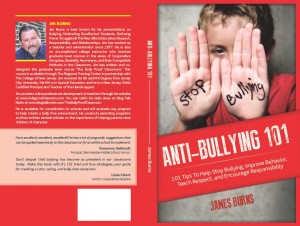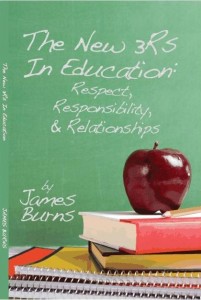by James Burns | Jan 5, 2017 | Bible, Bully Proof Classroom, Reflective Journal, Uncategorized
Introduction
Captive Thoughts
2 Corinthians 10: 4-5 KJV
For the weapons of our warfare are not carnal, but mighty through God to the pulling down of strong holds ; Casting down imaginations, and every high thing that exalteth itself against the knowledge of God, and bringing into captivity every thought to the obedience of Christ;
I was first introduced to this verse as a relatively new Christian in 1992. In reading it and memorizing it I discovered a few very important points about life, and by that I mean not just the Christian life:
- We are at war and the war is not physical but spiritual (The weapons of are warfare are not carnal)
- The world and our imprint (events and words that have affected us that are untrue) have created strongholds in our thinking.
- Our goal is to use God’s word to cast down imaginations (false conclusions about ourselves and/or our circumstances) and as we read and meditate on scripture to change our thoughts (bringing every thought into captivity making it obedient to what Christ has to say about our life, and who we are).
Our thoughts are only the beginning. As we think we can slowly begin to say things to others about ourselves or about them communicating information that is untrue and use a jaded mind in doing so. So our thoughts lead to words.
As we speak we can begin to mull over in our minds courses of action that could be taken that in most instances are based upon false conclusions and could have devastating results. Our words lead to actions.
Most times these actions are taken with the wrong attitudes and have nothing more than selfish motives. The actions could be taken in anger with the motive to hurt someone or for revenge.
Please click the links below and listen to the following podcasts. They discuss our areas of responsibility, our thoughts, words, actions, attitudes, and motives. If you are using the hard copy version use the link that is shown.
Podcasts on Responsibility
Responsible Thoughts https://drive.google.com/file/d/0B7YYeIComheYaElySnpFNDZoUGM/view?usp=sharing
Responsible Words https://drive.google.com/file/d/0B7YYeIComheYX21wQzFPaEtyclk/view?usp=sharing
Responsible Actions https://drive.google.com/file/d/0B7YYeIComheYUncyek9BZzVvRU0/view?usp=sharing
Responsible Attitudes https://drive.google.com/file/d/0B7YYeIComheYSlFNakRtYkV6Z1U/view?usp=sharing
Responsible Motives https://drive.google.com/file/d/0B7YYeIComheYTWx5dlZNczN0TDQ/view?usp=sharing
All of these podcasts were done during 2013 and were part of a blog talk radio broadcasts. They were done as tips for everyone to show the progression of thoughts to actions and why a person’s attitude and their motives are so important.
This reflective journal is designed to give Christians and non-Christians an opportunity to see the power of God’s word and to use it to help change the way they think. I have offered ten topics for consideration with a scripture verse as a starting point. The reader then works to discover more scripture that relates to the topic of their choice and journals about their progress and experience in trying to change the way that they think. Always remember it is our job to do our best, but we should trust God to make up the difference.
All scriptures verses were taken from The New English Version of the Bible unless otherwise noted.
To Order Your Journal Click On The Image Below

Save
Save
Save
by James Burns | Jan 5, 2017 | Bully Proof Classroom, James Burns, Kryptonite, School Administrators, Teachers, Uncategorized
Before You Read This Book Please Read This
- In writing this book I interchange kid, student, child, and he and she. They all mean the same thing.
- I interchange parent, teacher and society. They all merely mean someone who is supposed to be in charge.
- You will find one intervention used for multiple behaviors. That’s because they work with different kids in many situations.
- I see many behaviors as being learned but don’t doubt that there may be organic problems that cause the behavior.
- I will not joust with anyone regarding conditions such as ADHD or ODD. My goal is to help create an understanding between what is a condition and what is a learned behavior.
- I don’t doubt that circumstances can give us reasons for certain behaviors; but there are no excuses.
- In my final thoughts I include an article “Everybody Knows” please read it. By the way you can find it on youtube and it is now a self study course that you can purchase here http://payhip.com/b/E1cs
- I am sure that there are many more behaviors that teachers and parents deal with other than the ones mentioned here.
- I am an Anti Bullying Consultant, retired principal, speaker, and writer. I have observed that most behaviors that we deal with are relationship based and disrespect, irresponsibility, and unkindness, apathy, and willful non-compliance pervades our society.
- Some things work some of the time but, nothings works all of the time.
- This is only volume one. If you have behaviors that you would like me to include in future volumes please email me at jameshburns55@gmail.com.
- Please read the articles associated with the behaviors and other supporting information in the appendix.
Introduction
There are people that we absolutely can’t stand. There are those that lie, cheat, and steal. There are whiners, complainers, gossip hounds, and sneaks. There are some who are so arrogant and are such a know it all that a conversation with them is almost painful. There are those that are so angry that we avoid telling them things that they don’t want to hear because we fear their reaction. Then there are those who are absolute criminals who don’t have a conscience who do things that are designed to inflict pain and suffering on other’s. Professionals who work with these people are trained to look beyond certain behaviors and convince themselves that they like the person but don’t like their behavior. Good luck if you are a teacher because kids who exhibit certain behaviors are just plain unlikeable, and in reality they know that they are unlikable and it may even be his/her way of getting the negative attention that he is starving for. The adults who exhibit some of the behaviors mentioned above were once kids who learned how to get away with things like disrespect, irresponsibility, and non-compliance as students and now have taken their deviance to a level that their life and the lives of others are being negatively impacted.
It doesn’t matter if it is organic or learned certain things just can’t be tolerated. Some of the behaviors are so inter-generational and so ingrained that that we can believe that the person is determined and that the apple doesn’t fall far from the tree and up bringing or genetics is the issue. In reality though we are only influenced by our genetics or upbringing and there has to be a switch in thinking as we change our response to negative influences. By the time a child starts kindergarten certain conclusions have already been drawn and he/she already believes that a temper tantrum gets the job done and I will get what I want when I want it. Until of course they discover something different and have to revert to deviance to get what they believe they are entitled to.
Behaviors like the ones just mentioned can’t be and should not be tolerated by schools or by society in general. Why; because they weaken families, systems, and classrooms. They become like Kryptonite and can begin to eat away at the moral fiber of society. For teachers life can become a nightmare when they have to deal with continual deviance and can’t do what they are paid to do and that’s to teach. Here are ten behaviors that I believe are like Classroom Kryptonite and if not dealt with early will do nothing more than prepare kids for a lifetime of misery who will try and shoehorn themselves into systems that will not accept their perception of life and their negative behavior.
We will assume that there are two reasons for negative behaviors; they are either learned or that they are organic meaning that there is some form of mental illness associated with the behavior that has affected a person’s judgment or has resulted in poor impulse control.
Kids often have what I call a “Choosing Disability.” In other words they have not developed the ability to make the correct choices and have trouble determining right and wrong behavior. There are reasons for poor choices but there are no excuses. Excuses when used can imply that we believe that the behavior should be excused with no consequences being imposed. Reasons explain the circumstance but regardless still hold the person accountable with a consequence. There is a short article that I wrote many years ago that offers a clear explanation. You can find it in the appendix as article one.
Order Your Copy By Clicking On the Image

Save
Save
by James Burns | Dec 19, 2015 | James Burns, The Ramblings of a Dinosaur, Uncategorized


Have you ever wondered why your parents did some of the things that they did. I did lots of times. My dad had so many regimented activities that I thought he had a screw lose or something. I’m only going to talk about two here because there are too many to put into one essay. I really spent time observing my dad as a kid and listening to him, and it wasn’t until I was about forty that I realized some of the benefits of his behavior and very recently some of the real benefits of his behavior. My dad had an unbelievable fear of getting a cold. He came home from WWII with malaria and tuberculosis. He was always cautious of sharing food, towels, cups, and silverware. Any watermark on silverware in a restaurant was sent back immediately. I remember one time in a restaurant in New York a fork went back three times. Some people send food back he sent the silverware back. It got so bad that one guy sitting close to use told my dad that the he thought that the waitress was on Candid Camera. If you sneezed you were accused of trying to bring a cold into the house, to try and kill him. He was hospitalized on December 27, 1967 due to a reoccurrence of the TB and was sent to the infirmary at the veteran’s hospital in East Orange NJ for 3 months. When he came out that’s when anything and everything could give him a cold. Two things were absolutes, cold feet and white flour. I never saw my father walk around without shoes or slippers on. He wouldn’t walk three feet without putting on a pair of slippers. If you sneezed he would always ask you what you ate. My sister, my mother, and I thought he was crazy. Bare feet and white flour would make you sick and if you got sick, well as he put it, “If I get a cold I am finished.”
All of these things I observed always stuck with me. When I was about 40 years old I started to battle my weight. Always watching my calories and trying to stay in shape. The Atkins diet started to become very popular along with other diets that restricted carbohydrates, and other foods that contained you guessed it, white flour. Exactly what the old boy was talking about 30 years ago. Suddenly everyone had a carbohydrate allergy, was gaining weight, had type-two diabetes, high blood pressure, and all kinds of health issues because of white flour. I started to watch my white flour intake and I started to lose weight. The stuff I loved as a kid was something that could now kill me. The stuff that my father said could make me sick was making me sick.
Recently I was walking around the backyard with a pair of flip-flops on. I have a tendency to drag my feet when I walk primarily because my feet are kind of flat, something that I also inherited from my dad. I walked from the shed to the concrete walkway and slammed my right foot into an Adirondack chair. I know I broke the middle toe, at least it looked broken. The next day passing through the garage I stubbed the same toe on a hand weight in the middle of the floor. I got into the car in agony looked down at my foot which had the same $3.00 flip-flop on it and I could hear my father say to me, “Will you please put your slippers on.” This isn’t the first time I stubbed that toe but it is the first time it dawned on me that my father knew me because I was just like him. He didn’t want me to go through the same agonies that he had gone through. He didn’t want me to get fat or stub my toes he just had a strange way of letting me know. I don’t think he ever gave me the reason why he did what he did, that’s probably why it took me thirty years to figure it out on my own. If I could ask for something I would ask that my two daughters learn the reasons why I do what I do quicker than I learned things from my father. There’s a question that kids ask all the time “Why do we have to do this?” Sometimes by the time that gets figured out it’s too late. So put your slippers on and have a piece of whole wheat toast, you’ll be glad you did.
by James Burns | Feb 10, 2015 | Anti Bullying Tips, Bully Proof Classroom, Coaching, Parents, Teachers, Uncategorized
Introduction
Since the dawn of public education teachers and schools have focused on the academic achievement of students. All students were expected to leave school with basic reading writing and math skills. Some kids excelled and went on to institutions of higher learning, some were trained at a trade such as carpentry, or auto mechanics, and still others left school with those basics and worked at more labor related jobs such as factory or office work. Everyone who left secondary school did have the basics just at different levels. Every student may not have had the capacity to go to college but just about everyone finished school and had the ability to function in the real world. With the onslaught of state mandated testing in so many school districts throughout the country teachers are still pressured to ensure that students achieve but the landscape has changed and hitting the bull’s eye is far more difficult than it was say forty years ago. The bull’s eye is tough to hit because teachers are now being asked to hit a moving target. The target keeps moving because the levels of disrespect, and irresponsibility pervades our schools and basically you can’t hit something that won’t sit still, keep quiet, come prepared, stay motivated, and who really has taken no ownership for their own education.
Local and state boards persist though in their belief that success is based upon achievement not on effort and character. The faulty philosophies that have come out of some of our colleges that focuses more on methods of instruction rather than behavior management has both young and veteran teachers alike trying to figure out how to hit that moving target. In schools right now we don’t need one more test, or in-service that helps teacher’s understand how to teach to the test we need a comprehensive program that focuses squarely on student behavior management, teaching respect, and encouraging responsibility. Our young teachers who have been in the field for between three to five years may not know any different and are hounded daily regarding the academic achievement of students whose behavior is out of control, and veteran teachers who have done a good job of reading the tea leaves are planning for retirement because the work load is increasing to the point that it is becoming unmanageable.
Our focus in education needs to be on steadying the target and improving student behavior, not on improving test scores. If we begin to focus on behavior, character, and effort rather than achievement test scores will naturally go up because we will begin to develop willing learners.
Colleges need to provide stronger training in the area of behavior management for future teachers and we need to provide more comprehensive training in the area of behavior management for teachers who are now in the field. Here are ten good reasons why:
1. Take a look at the schools
The behavior in our schools has deteriorated to the point that we don’t worry about school violence we worry more about school shootings. We are forced to get everyone to the finish line without mastery of basic content. So many kids come into schools with negative learned behaviors that we are forced to develop conditions to support the behavior. It would either be invent the condition or throw the kids out, but you can’t throw out the entire twenty to thirty percent of the chronic behavior problems. These kids aren’t going anywhere and they are going to make it tough for kids who want to learn to learn. So, if we want to teach the other seventy five to eighty percent we better figure out how to manage behavior problems.
2. This isn’t forty years ago
Let’s face it years ago parents supported the school and dealt with their child’s misbehavior. Today we have to fight the kid, the parent, and at times city hall. In addition the behaviors that we dealt with forty years ago were of the garden variety like having a playground fight, or goofing off in class. Today the levels of disrespect, and irresponsibility, are at such high levels that younger teachers have begun to view some of the behaviors as the “new norm” and anytime there is the slightest improvement they fall all over the kid with praise causing the kid to feel good about himself for no apparent reason.
3. Standardized testing is not a measure of achievement
Teachers are trained to teach to the test. Even for content related testing during the year there is this unspoken fear of failing a kid. Most kids have an inflated view of their academic ability and don’t realize their shortcomings until later in life when grades are more meaningful. Good grades are nice, but mastery is better. Students move through grade after grade with un-mastered skills and a lack of the necessary prerequisites to learn new information. This produces frustration, anxiety, and tension resulting in behavior problems.
4. Life is about Relationships
Ask any employer. They are more concerned about the attitude of their employee than whether or not they can do the job. They believe that they can always teach a person the skills on their job description, but they can’t teach the person how to get along. School is supposed to be a microcosm of society. Employers want their employee’s to be respectful, responsible, have a good attitude, can get along, show up, and are on time. Sound like school? If this is what employers want we should be teaching it; that is if we can find the time in the overly ambitious curriculum that is being used to help prime a kid to pass a test.
5. We don’t know how to have productive conflict
There are so many intergenerational dysfunctional problems in our families, schools, and in society in general that faculty rooms have become discussion forums. No answers, just discussions. The topic of the day here is the inability to confront each other, a student, parent, or an issue, or maybe our own demons. Productive conflict is something that is taught it is not an innate skill. Teachers may have difficulty with conflict strictly based upon their own life imprint. It is a skill that needs to be taught to our student’s so they can have disagreement and do it with the right attitude, and they can cooperate even though they may disagree. When this skill is not taught, power struggles are inevitable and relationships get strained. Some families don’t even talk to each other because of an unsettled youth conflict that became an adult conflict. Don’t worry once kids know this they’ll pass the test.
6. There are too many adults with poor attitudes
Kids are kids for a short period of time. Then they become adults; with the same crummy attitudes. Even the most intelligent of adults can have such arrogance that they are painful to be around. This is the other eighty percent of our school population. Knowledge without character produces this type know it all mentality. They were once kids who did well in school but never developed the character in order to know how to make the best use of their intelligence.
7. Our students lack empathy
As a society we just don’t have the same concern for each other as we once did. By this I am referring to the overall concern that a family has for the elderly couple up the street when there is a heavy snow fall, or helping someone with a dead battery, or bringing meals to a shut in. Adults don’t care as they once did and our kids care even less. There are too many students who stand around in school when someone is being bullied. Let’s make sure that they pass the test.
8. Bullying behavior is on the rise
Hurt people hurt people. Bullies come from dysfunctional families, are angry, and take out their anger on others. They made that decision around the age of five. Everyone knew there was something wrong but not enough was done to quell his/her misery. Early intervention didn’t happen and we ended up with a bully on our hands who interferes with the learning of others and creates an emotionally unsafe learning environment for everyone. Let’s take a test.
9. Kids seek revenge
It’s not enough to get even anymore and have a fair fight and get it over with. Revenge is the way today and kids don’t want a pound of flesh, they want a pound of your flesh and the flesh of five others. Victims who have been bullied don’t know how to fight back or have a productive conflict they digest the abuse and then act out when the time is right. Stop testing and start strengthening the victim. You will help them pass the test.
10. Some kids may be smart but they lack wisdom, and common sense
The smartest kids in the class could be the most deviant, and make the poorest choices. There are more kids today that can’t even make the smallest decision and can be led around by the nose by the wrong crowd. Smart doesn’t mean wise and at times even the smartest kids can lie, cheat, steal, and abuse others. Maybe even better than the average kid. There are all kinds smart and this kid is one dimensional, but he will pass the test.
Programs Needed
Motivating Disaffected and Hard To Handle Students
Designed For Teachers, Administrators, Guidance Counselors, Child Study Team Members, or Any Youth Care Provider
• Learn the symptoms of difficult students and treatment plans that work
• Build respect and rapport with your most difficult students
• Understand why students don’t care
• Develop language that confronts without condemning
• Break through the emotional wall of your students and increase motivation and responsibility
• Strengthen relationships with your students
There is a direct relationship between motivation and discipline. The hard to motivate are often hard to discipline. Teachers are becoming increasingly more frustrated and are asking what we do with students who are not prepared, don’t care, will not work, and are on track for failure as adults. Finding tools and strategies to increase motivation can solve many behavior problems. There are many things educators can do to reawaken motivation in students who have lost interest and perhaps hope. This seminar helps teachers develop techniques that build respect, increase responsibility, and develop greater compliance in students who are hard to handle. It helps teachers overcome the strong emotional frustration that saps their energy and ultimately leads to burnout.
Six Principles That Help Educators Help Students
1. Design – All students are designed in a unique way. This program helps teachers understand the problems that difficult students face and how we can improve their self-esteem and permanently change their behavior.
2. Authority – Help students understand the definition of maturity. Teach them respond to authority correctly to create more emotional freedom.
3. Responsibility – Learn the five key areas students are responsible for and stop their reactive and escalating behavior.
4. Ownership – Help students manage anger. Students will understand that they are not victims but people who can control their own responses.
5. Success – Help your students find answers to problems that occur and give them hope for the future. Get students to respond correctly in key relationships.
6. Problem Solving – Give your students the skills to self generate behaviors that build independence and maturity.
You Will Learn How To:
• Emphasize effort, create hope, build relationships, respect power, and express enthusiasm
• Teach respect, responsibility, and compliance
• Build relationships with even the most difficult students
• Establish guidelines for correcting inappropriate behavior
• Use the three-step process for correcting behaviors that works without fail
• Give a warning that communicates you say what you mean and mean what you say
• Build a student’s self esteem
• Help a student control his anger
• Teach relationship skills that work for a lifetime
• Keep students on task and focused
• Use visual cues that prevent confrontations and stop power struggles
The Bully Proof Classroom
Bullying has become an epidemic in our schools. However it is defined, bullying is not just child’s play, but a terrifying experience many American school children face every day. It can be as direct as teasing, hitting, or threatening, or indirect as exclusion, rumors, or manipulation. During the past decade, bullying has become more lethal and has occurred more frequently than it had in the previous two decades. Bullying can no longer be explained away, as some adults are inclined to do, as a normal part of growing up. Bullying has only harmful, not beneficial, effects for the target and the perpetrator- even the bystander. Many children in our nation filled with fear and intimidation because they are bullied and victimized daily. Bullying exacts a terrible toll on children, and the scars can last a lifetime” (nea.org). This workshop is designed to give teachers, parents, and students the necessary information to stop this epidemic from spreading any further.
This seminar will help your staff answer the following questions:
• What is bullying?
• What are the characteristics of bullies and victims?
• How prevalent is bullying?
• What actions and behaviors constitute bullying?
• What are the early warning signs of troubled children and those at risk for bullying behavior?
• How can we help the victims cope and deal with a bully?
This seminar will provide for staff, administration, students, and parents:
• Ideology: Bullying terminology and definitions
• Warning signs and characteristics of bullies and targets
• How to develop respect, responsibility and compliance in children
• Foundations of good character; teach students character qualities they will need for life-long success
• Strategies that help bullies and targets improve their coping skills
The New 3R’s in Education
Respect, Responsibility, and Relationships
The True Basics For All Success In life
Everybody knows what the 3 R’s of teaching are – reading, writing, and ‘rithmetic. But educators don’t totally understand that in order to teach these basic subjects successfully, they must constantly be working to develop respect and responsibility in their students. No longer can it be assumed that children develop these attitudes at home. Plus, teachers must learn how to build positive relationships with their students. Strong teacher-student relationships naturally foster a positive and safe learning environment where much learning will take place and where all students will become capable, connected, and contributing members of their classrooms.
Learn Practical Strategies That Will Teach The New 3r’s
1. Teach respect, responsibility, and compliance
2. Learn how to build strong positive relationships with students and parents
3. Understand how principles, rules, and procedures create a secure safe environment
4. Create a fair, and consistent learning environment that will be calming to even your most difficult students
5. Understand how to give instruction, warnings, and correction
6. Receive a set of effective consequences for grades K-12 that will impact future behavior
7. Practice proven verbal responses you can use in a crisis situation
8. Build respect and rapport with your most difficult students
9. Develop language that confronts without condemning
10. Break through the emotional wall of your students and increase motivation and responsibility
Defusing Power Struggles With Your Most
Difficult Students And Parents
Designed For Teachers, Administrators, Guidance Counselors, Child Study Team Members, Or Any Youth Care Provider
• Learn the symptoms of power struggles and how to deal with them
• Build respect and rapport with your most difficult students
• Develop language that confronts without condemning
• Break through the emotional wall of your students and increase motivation, compliance and responsibility
• Strengthen relationships with your students and parents
A Proactive Approach For Dealing With Power Struggles
Effective discipline can no longer be achieved solely through using authority. A typical school today has some students who have short fuses, and some who anger easily. Students today may make offensive statements and act in a hostile manner that can trigger a power struggle. Often, too much instructional time is lost because of minor disruptions that all too quickly escalate into classroom battles that destroy relationships and any positive climate that exists. To keep the focus on educational achievement educators must master how to avoid and diffuse power struggles. This practical workshop will present easy-to-learn methods of effective intervention that preserve students’ and teachers’ personal dignity.
Learn Practical Strategies That Prevent Power Struggles
1. Teach respect, responsibility, and compliance
2. Learn the warning signs for the onset of a power struggle
3. Learn how to build strong positive relationships with students and parents
4. Understand how principles, rules, and procedures create a secure safe environment
5. Create a fair, and consistent learning environment that will be calming to even your most difficult students
6. Learn proactive language that will diffuse potential power struggles, and allow you to gracefully exit from power struggles that do erupt.
7. Learn Techniques You Can Use When A Student Has Too Much Power In Your Classroom
8. Learn fogging techniques that distract and disarm the verbally aggressive student
9. Understand how to give instruction, warnings, and correction
10. Receive a set of effective consequences for grades K-12 that will impact future behavior
11. Practice proven verbal responses you can use in a crisis situation
Climate Control For
Your School and Classroom
This Conference Will Provide Teachers, Administrators, Anti Bullying Specialists and Coordinators with the Necessary Skills and Strategies to Help Teach Respect, Encourage Responsibility, Reduce Bullying Events, and Improve The Overall Behavioral Climate in Their Classroom and School.
This conference will help answer the following questions:
1. What are the characteristics of positive classroom/school climate?
2. Why is classroom/school climate so important?
3. How do I encourage respect?
4. What do I do with disrespectful behavior now?
5. How do I increase student accountability and build greater student responsibility?
6. How does an improved school and classroom climate increase student achievement?
7. Why is it so important for kids to feel emotionally safe?
8. What do I do with disrespectful and unsupportive parents?
9. How can we help the victims cope and deal with a bully?
This conference will provide for staff, administration, and
child care professionals:
1. 12 Strategies to help improve classroom/school climate
2. How to develop respect, responsibility and compliance in all students
3. How teach students character qualities they will need for life-long success
4. Strategies that help bullies and targets improve their coping skills
5. How to develop a code of conduct that can be effectively communicated to all students
6. How to be more effective in changing student behavior
7. The importance of getting and keeping everyone working on the same school goals
Become Your Personal Best
A in-service for teachers, administrators, CST members, guidance personnel, support staff or anyone who wants to learn powerful principles in personal change
What This In-Service Will Do For Educators:
1. Learn the principles of personal growth and change
2. Begin to understand who you really are and what your purpose is
3. Build powerful relationships with co-workers and superiors
4. Develop effective communication skills to use with parents, students, superiors, co-workers
5. Learn how to become part of the solution rather than complaining about problems
6. Build rapport with the most difficult co-workers and parents
7. Learn how to be proactive rather than reactive
8. Learn how to build security and confidence through your own success
9. Learn wise time management
10. Build team building skills
11. Learn how to identify problems in your own value system and how to improve it
12. Restore the character ethic to your own life
13. Develop a balance in your physical, mental, and social and emotional life
A Proactive Approach For Dealing With Life
In education, we constantly have sought to improve the behavior and the academic achievement of our students. Almost every continuing education workshop or class is designed to help educators accomplish this. Even though this is valuable, these workshops fail to address the idea that it is the character of the teacher that will affect students’ success in the classroom and ultimately in life. Educators can fall into the trap of becoming so focused on the deficits of others, i.e. the students, the parents, supervisors, child study members, and co-workers that they become less concerned about their own areas of weakness. This workshop is designed to teach your educators how to become more self-aware and give them strategies to personally strengthen their value system and their character. The effect of your educators moving closer to becoming self-actualized will be that they will become more effective in their respective roles, and they will be much better equipped to meet the needs of all of their students.
You Will Learn How To:
Realize Your Ultimate Personal Potential And
Become The Best Educator You Can Be
Character Is Everything
Changing Student Behavior from the Inside Out
Designed For Teachers, Administrators, Guidance Counselors, Child Study Team Members, Or Any Youth Care Provider
1. Create an awareness in students, teachers, and administrators of the importance of character and its relationship to achievement
2. Build relationships with your most difficult students
3. Understand the root problems behind lack of student achievement
4. Develop language that confronts without condemning
5. Understand the Emotional Bank Account and make deposits of praise and acceptance
Proactive Approach For Dealing With Behavior Problems
Much has been said over the years about the student who is difficult to manage, and who exhibits behaviors that lack a moral compass. Educators and child-care providers need strategies that address the pervasive problems of disrespect, irresponsibility and a lack of compassion for their fellow students. In this seminar Jim Burns addresses the problems that are at the root of these behaviors. Character training truly makes a difference in the outcome of a student’s life. As a student builds character he/she will become more successful. Students who are taught character qualities such as honesty, reliability, diligence, and respect learn to change their behaviors from the inside out and truly understand how to self generate positive behaviors, and have a change of heart, not just a change of mind.
Qualities Developed Through Improved Character
1. Self-Acceptance – As students are recognized for showing specific character qualities, they will improve in other areas as well, such as achievement, respect, and responsibility.
2. Responses to Authority – As the key people in the school recognize these positive qualities in each student, students will have a more positive response to them. Teachers, administrators, and support staff will then be able to discipline students in a much more positive manner and teach the necessary skills for lifelong success.
3. Relationships – Because there is so much positive reinforcement for students in the praising of character, students will begin to see each other in a more positive light. Students will then encourage positive character in each other.
4. Priorities – Because students will begin to feel better about their own character, they will be able to focus on achievement. This will help to reduce anxiety and eliminate bad habits.
You Will Learn How To:
• Teach character through instruction, example, and activities
• Recognize positive character in students and praise them for their efforts
• Change the way you look at student behavior
• Model positive character for your students
• Give a warning that communicates that you are concerned about the student’s reputation
• Build a student’s self esteem
• Help a student control his/her anger
• Teach relationship skills that work for a lifetime
• Use character to improve student attendance, grades, and test scores
• Use behavioral referrals as an instructional tool to teach character
About Jim Burns
Since 1977 Jim Burns has been working with students who have learning disabilities and behavioral problems. He has almost 40 years of experience working as an administrator, teacher, college instructor, and seminar leaders. He is committed to helping administrators, parents, and teachers establish standards of excellence and help them build successful relationships with their staff, students, and children. He has written and designed The Bully Proof Classroom, a graduate course that is now offered at The College of New Jersey in partnership with The Regional Training Center. This course is endorsed by the NJEA. He has also written “Anti Bullying 101.” A book that provides teachers, administrators, support staff and parent’s 101 tips on how to achieve permanent help in dealing with unruly behavior and can be used as part of any anti-bullying program. He is available for on sight in-services and keynotes and can be reached at 1-732-773-9855 or at jameshburns55@gmail.com
Books Available






by James Burns | Oct 30, 2011 | Uncategorized
As a young boy I experienced all kinds of problems in my family. My father was a bar owner and a pretty heavy drinker. His behavior was very unpredictable at times, and we never knew what was going to set him off. We were always walking around on egg shells because we didn’t want to say or do something that would send him off on a drinking binge. I knew though that my father had a real interest in me, and wanted the very best for me. He just had a hard time expressing how he felt. As I became older and entered my teenage years my dad started to enjoy watching me play high school and community league baseball. He would go to my games, leave alone when the game was over (as I went with my friends), and would usually say very little to me about my performance. I never really expected him to say anything, so I was never disappointed.
During the summer of 1971 when I was 16 years old, my first cousin Jim and I spent a lot of time together at each other’s houses. We played baseball and hung out with other kids. I enjoyed the visits, and so did he. He was an only child, and I was the only boy in my family. We had a lot in common, and during this time we were pretty good friends. My cousin wasn’t quite as good at baseball as I was, but he was what I call a rooter. He enjoyed watching baseball and really enjoyed watching me play. During one of his visits I had a scheduled game. I had to be at the game early so my dad and cousin came later. During the game I had three hits including the game winning hit. I was the catcher and threw three runners out trying to steal second base. I had a great game. When the game was over my dad drove my cousin back to his house, and I hung out with my friends.
I went home, went to bed and got up early the next morning and left the house. The normal routine was that would open the bar in the morning. My father would sleep a little later and then relieve her in the bar around 11:00 in the morning. He would work until about 4:00 in the afternoon and then come upstairs and take a nap. I can always remember him sitting in his recliner napping in the afternoon. He needed that nap; he was in his late 50’s and had to be ready to work the night shift.
That afternoon, I returned home around 5:00 to find my father in his recliner, but he was awake. He jumped up out of his chair like he had a spring under him. He ran over to me and hugged me hard and said, “I was so proud of you last night.” I thanked him, and I felt him squeeze me like he never did before. I felt the warmth of his body, but even more felt the warmth of his words.
Well, I’m 56 years old now, and I still remember that hug and those words. Sometimes parents can say so much to their kids about their performance that it can almost seem like white noise. Most kids know their parents are going to speak well of them, because they are their parents. But sometimes kids can get a false sense of their abilities when their parents go overboard with the praise. But, the right words of praise and encouragement at the right time can actually change a child’s life. In my case, my dad didn’t offer a lot of praise. As a matter of fact he was very critical of me at times. This experience was life-changing for me. I quickly forgot all the times my father had said critical things to me. As a father myself, I know I have the power to determine how my own children view themselves. A father’s words do truly make a difference.
http://www.youtube.com/watch?v=Q29YR5-t3gg&feature=related















